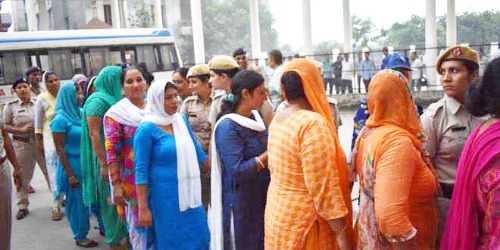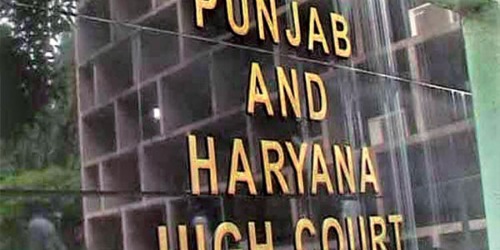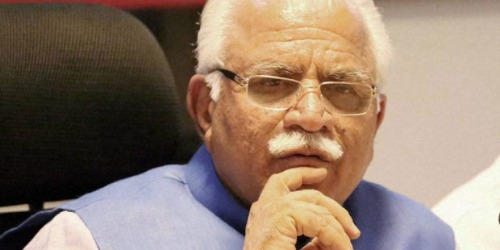No neurosurgeon at emergency of Karnal hospitals

Karnal :
Amid tall claims of the government of providing better health facilities to the general public, government-run emergency services at Kalpana Chawla Government Medical College and Hospital (KCGMCH) and Trauma Centre of Civil Hospital are running without neurosurgeon, forcing patients to go to private hospitals.
Both institutes do not have the sanctioned posts of neurosurgeon and referring patients with head injury is a common phenomenon at both centres. However, the KCGMCH has claimed to have tied up with four private neurosurgeons for the last three months, but still patients are being referred to other institutes.
The data for the last three months of the KCGMCH shows that of the 234 patients with head injury, 99 were referred to other hospitals. All 12 patients with head injury at the Trauma Centre were referred in the absence of general surgeon and neurosurgeon. “We do not have any sanctioned post of neurosurgeon, but have engaged four private neurosurgeons on alternative weeks for the last three months,” said Dr Surinder Kashyap, Director, KCGMCH.
“We have started the Trauma Centre recently. We do not have any neurosurgeon or general surgeon. In the absence of the both, we have no option but to refer patients with serious head injury,” said Dr Piyush Sharma, PMO, Civil Hospital.
Sumita Singh, two-time former MLA and Congress leader, said, “If both hospitals have the facility of neurosurgeon, precious time to save the life of accident victim can be saved.”
Should the Government manage doctors?
- 1088
- Leave a comment
Rao Inderjit plans to expand political activities across state

Chandigarh :
The Union Minister of State for Planning, Chemical and Fertilizers, Rao Inderjit Singh, appears to be aiming for a bigger role for him after the 2019 polls and with ostensibly this in mind, he plans to expand his political activities across the state in the coming months.
Though the minister does not admit that he is eyeing some more important assignments for him after the next year’s elections, yet he says even during the last Parliamentary elections people gave him votes to see him Chief Minister of the state.
Whether he still aspires to become the CM after the 2019 elections, the minister said, “Now, I have buried all my aspirations.”
“The objective of my rallies is to strengthen democracy,” Rao adds. The minister is to address two rallies at Firozepur Jhirka (Mewat) and Palwal in October and then move on to the other districts of the NCR next month.
Talking to The Tribune, Rao said that rallies across the state would be organised in the run-up to the Assembly elections once the Parliamentary elections were over.
“I will go wherever people call me to address rallies. There are no area restrictions for any politician. My differences with former CM Bhajan Lal started only because he wanted me to restrict to my own Assembly segment. I told him that then he should also restrict himself to his Adampur Assembly segment alone,” he adds.
Seen directly and indirectly confronting Chief Minister Manohar Lal Khattar during functions in his Gurugram Parliamentary constituency in the recent days, Rao denied he had any differences whatsoever with the CM.
“I enjoy cordial relations with Khattar. Even with Bhupinder Singh Hooda, I have very good relations. His son Deepender is very dear to me. In politics, people should maintain respect for each other irrespective of the political affiliations,” he said.
Will Rao Inderit be successful?
ESMA ENFORCEMENT : 382 health workers booked in state

Chandigarh :
As the strike by multi-purpose health workers (MPHWs) on Friday entered the 12th day, the government started getting tough with the striking staff with 382 employees being booked under the Essential Services Maintenance Act.
According to sources, 225 employees were booked in Narnaul, 90 in Rewari, 33 in Panipat, 14 in Kaithal, nine in Yamunanagar, seven in Ambala, three in Yamunanagar and one in Hisar.
Ompati Kadian, president of the MPHW Union, alleged that the police and the authorities concerned were resorting to highhandedness to force striking employees to join duty. “Despite repression by the authorities and police, the strike will continue till our demands are met,” he said.
Sarv Karamchari Sangh general secretary Subhash Lamba alleged that though the Health Minister had been claiming that most demands were accepted, no notification was issued.
The MPHWs had been on strike since August 27, demanding declaration of posts as technical, hike in pay, regularisation of services of contractual women MPHWs after two years, equal pay for equal work and uniform allowance.
Is the government oppressing employees?
No HC ban on appointments under quota for poor: AG

Chandigarh :
There is no stay by the Punjab and Haryana High Court on the issuance of appointment letters to the candidates selected under the economically backward persons in general (EBPG) category whose appointment process was initiated before December 7, 2017, Haryana’s Advocate General Baldev Raj Mahajan has clarified.
Mahajan, in an official communication to Chief Secretary DS Dhesi, clarified that the HC stay in a case relating to the recruitment of multipurpose health workers (MPHW-Female) was not applicable to any other category and various departments were free to issue appointment letters to the EBPG category candidates. On August 3, 2018, the HC had stayed the issuance of appointment letters to the MPHW (Female). Following the HC stay, various departments had been seeking clarification whether they should issue appointment letter to the selected candidates.
“The stay order dated August 3, 2018, against issuing of appointment letters to the EBPG candidates in the MPHW case does not apply to any other appointment made by any other department of the state government as the same are not in issue or in question in the said writ petition….The state government can proceed to give appointments and permit joining of such selected candidates provided their appointment process was initiated before December 7, 2017,” Mahajan’s communication said.
Previous Congress government under Bhupinder Singh Hooda had come out with 10 per cent quota for EBPG category on September 27, 2013, before the Assembly elections in 2014.
Various writ petitions had challenged this quota. In one of the orders, the High Court had allowed the appointments for the EBPG category candidates where the appointment processes were started before December 7, 2017.
Meanwhile, the Chief Secretary’s office on Friday directed various departments to issue appointment letter in accordance with the advice of the Advocate General.
Did the HC make the Right Decision?
Mayor to be elected directly in Haryana

Khattar Cabinet approves move
Chandigarh :
After laying down educational qualifications for candidates contesting elections under Panchayati Raj Institutions, the Manohar Lal Khattar government in Haryana on Wednesday approved direct election of mayors — an obvious bid to strengthen its hold over local bodies.
The Haryana Cabinet gave its nod to the move, which will have an impact on 10 big districts. Sources claimed in cities such as Faridabad and Gurugram the mayors would wield more power than the local MLAs with their area of influence extending to constituencies represented by the latter.
This decision, sources said, was aimed at ensuring the mayors functioned independently, without the councillors’ meddling. “With direct elections, his chair will not be dependent on the support of councillors. Also, it will check horse-trading to catapult a particular candidate to the post,” explained sources.
Elections to five municipal corporations — Hisar, Karnal, Rohtak, Yamunanagar and Panipat — are due in October and may be announced shortly.
The Cabinet’s decision on direct mayoral poll will be notified and the municipal elections held subsequently.
The voters will not only vote for the ward councillor but also the mayor. This is in line with the elections for panches and sarpanches where villagers vote for the sarpanch and the ward panch. Direct elections may also be held for the municipal councils and committees at a later stage.



